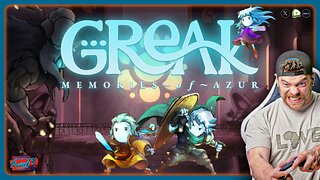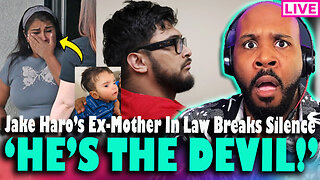Premium Only Content

"Wrongen" – The Lazy Shutdown of Honest Discourse. (An AI Production)
In this thought-provoking video, "Wrongen: The Lazy Shutdown of Honest Discourse," we explore the detrimental impact of the term "wrongen" in online debates. Originating from British slang, this label has transformed from a serious descriptor of untrustworthiness into a conversation killer used to dodge meaningful engagement. We analyze a recent exchange between Den Tarragon and John Wanoa, highlighting how name-calling stifles dialogue and fuels echo chambers. Discover why using terms like "wrongen" undermines truth and integrity in discussions. Join us as we advocate for genuine debate over lazy insults!
Don’t forget to like and share this video if you believe in preserving honest discourse! #HonestDiscourse #DebateCulture #Wrongen #CriticalThinking
In the digital age, particularly on platforms like YouTube, where debates, confrontations, and ideological showdowns often play out in the public square of comment sections and livestreams, the vocabulary we choose carries immense weight. One word that has crept its way into common usage among British online commentators is the term “wrongen.” On the surface, it might seem like a simple slang insult—a colourful way to call someone dodgy, untrustworthy, or morally corrupt. But underneath its simplicity lies a growing and troubling trend: the use of "wrongen" not as a descriptor, but as a conversation killer, a lazy retort, and a tool of intellectual cowardice.
The Context: Den Tarragon vs. John Wanoa.
To understand the power and misuse of the term, let’s look at a recent exchange involving YouTube commentator Den Tarragon. Den was invited to debate John Wanoa, a figure often dismissed as a scammer by a small corner of YouTube, though when scrutinised closely, there is no concrete evidence to support such a claim. Instead of engaging in discussion or even expressing a reasoned refusal, Den’s abrupt “no” was followed by a backhanded dismissal. When challenged on the hollowness of that stance, he responded with: “Good. Do one ya wrongen.”
In a single sentence, any expectation of open discourse was shut down. Not by logic. Not by reason. But by a name.
What "Wrongen" Really Means.
"Wrongen" (or "wrong ’un") originates from British slang, short for someone who is a "wrong one"—a person who behaves immorally, illegally, or unethically. Traditionally, the term has been used with serious implications: someone untrustworthy or dangerous. But over time, the bar for what qualifies as a "wrongen" has been lowered.
Today, you don’t need to be a criminal or a predator to be called a wrongen. You just have to disagree. Or worse—challenge someone’s narrative.
And that’s where the real danger lies. The term is now often used as a social silencer—an ad hominem label designed to delegitimise the person rather than the point they are making. In the case of Den Tarragon, “wrongen” wasn’t used to describe behaviour; it was used to avoid confronting an opposing viewpoint.
The Lazy Logic of Name-Calling.
Name-calling is one of the oldest tactics in the book. When facts aren’t on your side—or you simply don’t want to expend the effort of genuine debate—you call your opponent a name and walk away with your ego intact. It's the digital equivalent of sticking your fingers in your ears and shouting "la la la" while the other person is speaking.
Calling someone a wrongen doesn’t refute their argument.
It doesn’t expose flaws in their reasoning.
It doesn’t present a counter-narrative.
All it does is dehumanise the person and close the door on meaningful exchange.
The Consequences of This Culture.
Using “wrongen” as a debate-ending grenade might feel satisfying in the moment, but its long-term consequences are corrosive:
It erodes dialogue. Instead of building bridges of understanding, it digs trenches.
It deters participation. Who wants to join a conversation where disagreement risks instant personal attack?
It fuels echo chambers. With no one to challenge your view, you become more extreme in your beliefs.
It distorts justice. Labels like "scammer" or "wrongen" stick—even when unproven—and can irreparably damage reputations.
In John Wanoa’s case, he is smeared with the brush of “scammer” without a trial, without facts, and now, without even the courtesy of a conversation.
Conclusion: If You Can’t Argue, Don’t Insult.
The term “wrongen” has become a blunt instrument wielded by those who prefer dominance over dialogue. It's used to shut people up, not to open minds. And while it may succeed in avoiding uncomfortable conversations in the short term, in the long term, it starves the community of the very thing it needs most—truth.
Those who genuinely care about truth and integrity must resist the urge to label and run. Engage. Debate. Be prepared to change your mind—or to change someone else’s. But if your only contribution is “Do one ya wrongen,” then your silence might be better for everyone.
-
 LIVE
LIVE
Lofi Girl
2 years agoSynthwave Radio 🌌 - beats to chill/game to
341 watching -
 LIVE
LIVE
FyrBorne
11 hours ago🔴Warzone M&K Sniping: Finding Season 5's Best Strafe ARs
430 watching -
 4:47:50
4:47:50
The Why Files
2 days agoCOMPILATION: UFOs and Aliens Vol.2 | They are NOT our friends
61.2K43 -
 54:47
54:47
Side Scrollers Podcast
1 day agoSide Scroller Presents KING OF THE KART | MASSIVE MARIO KART TOURNAMENT
133K8 -
 14:47
14:47
GritsGG
17 hours agoRumble Tournament Dubular! Rebirth Island Custom Tournament!
37.1K3 -
 LIVE
LIVE
CassaiyanGaming
45 minutes agoClean Water Charity Stream Day 1 - Black Ops 6 Level Grinding
60 watching -
 LIVE
LIVE
PudgeTV
2 hours ago🟣 Greak: Memories of Azur | Gaming on Rumble | September Charity Water Campaign
42 watching -
 LIVE
LIVE
LarryDickmanGaming
10 hours agoI am what I am and that's all that I am.
57 watching -
 2:39:02
2:39:02
The Pascal Show
18 hours ago $2.14 earned'HE'S THE DEVIL!' Former Mother In Law Breaks Silence On Jake Haro & Emmanuel Haro Case
16.8K1 -
 5:30:10
5:30:10
SpartakusLIVE
13 hours ago#1 Verdansk Sniper gets HACCUSATIONS because of INSANE Headshots
62K4